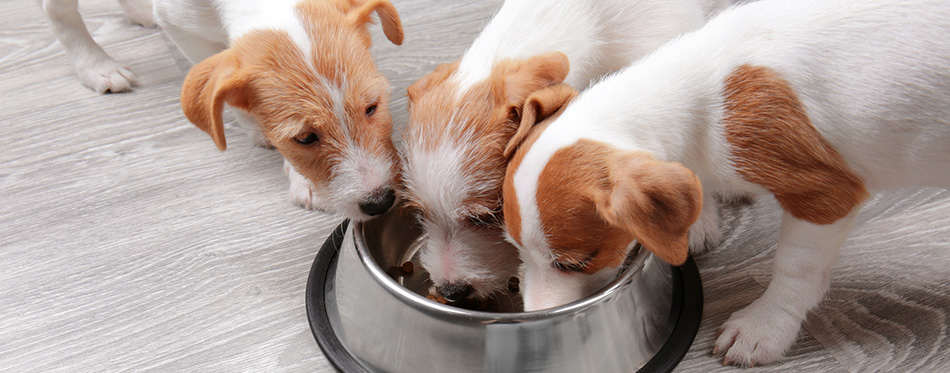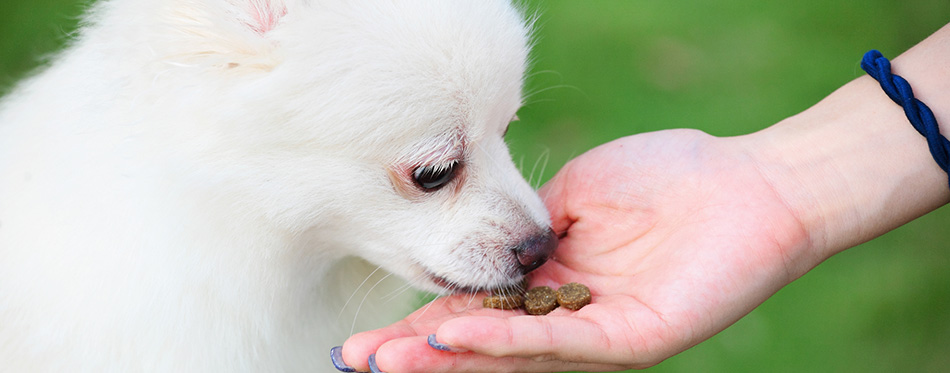Sometimes, the increasing number of dog food choices available can be a little overwhelming. From the constant battle between dry dog food and wet dog food to the best source of protein, and so on. Now, another question most dog owners seek an answer to is whether their puppies can eat adult dog food. A lot of new dog owners wonder what the big deal is. Why can’t one simply purchase standard dog food for their puppies? Does one really need to purchase specially made puppy food? Is there any difference? In short, can puppies eat adult dog food?
Difference Between Puppy Food and Adult Dog Food
So, can puppies eat adult dog food? The simple answer to this question is, feed adult dog food to your adult dog and feed puppy food to your puppies. Both foods are not the same as they were specifically made for different dog ages. Still not convinced? Let us take a look at the differences between the two.
First of all, puppies have a different nutritional need than adult dogs. That is the main reason behind the need for two different types of dog food. The difference in nutritional needs has a lot to do with the biological makeup of both groups of dogs. Puppies need growth and development food, while adult dogs need food to maintain their nutritional requirements – not more, not less. For example, an adult dog should have not more than eighteen percent of its calories from protein. A puppy, on the other hand, can have over twenty-two percent of its calories from protein sources. Puppies need more energy to bounce around than adult dogs do.

Can Puppies Eat Adult Dog Food?
As mentioned earlier, it is safer to give puppy food to puppies and adult dog food to adult dogs. This is because both types of dog food have been specially formulated to achieve different results. The nutritional needs of puppies are very different from that of adult dogs.
- First of all, puppies need to rely on their mother’s milk for up to eight weeks. During this period, the mother’s milk provides the main source of essential nutrients that cannot be replicated in any adult dog food. This is because it contains an ideal combination of proteins, carbohydrates, minerals, and vitamins.
- Secondly, puppy nutrition varies from breed to breed, just as puppies vary in size from breed to breed. Thus, all puppies do not require the same amount of food daily. It will, therefore, be unsafe to feed your puppy adult dog food.
- Calcium: Most puppies require at least three percent calcium in their daily diet. This is usually not available in adult dog food. Depending on your puppy’s breed, you will be doing it a lot of harm by not providing enough calcium in its diet when you give it adult dog food.
Take a look at our guides on Puppy Milk Replacers and Calcium Supplements for Dogs.
How Long To Feed Puppy Food
The general rule here is simple; if a dog is younger than a year old, it is still a puppy. And, as long as it remains a puppy, it must be fed with puppy food. As mentioned earlier, a puppy needs to rely on its mother’s milk for up to eight weeks. Afterward, puppy food formula can be introduced to it. However, as a puppy nears a year old, you have to be sure of the best time to bring in the adult dog food. If you are in doubt about how long to feed puppy food to your puppy, you can consult your veterinarian. However, there are some basic calculations you can make.
- The first is the eight weeks calculation. During this period, allow your puppy to feed on its mother’s milk as it contains all the essential nutrients the puppy needs, especially calcium. Once you are past the eight weeks stage, you have to consider other factors like the breed of the puppy and its size.
- Small and medium-sized breeds: Generally, at a year old, small and medium-size dog breeds are considered adult dogs. Thus, if your puppy falls within the small and medium breed range, you can feed it puppy food until its first birthday.
- Toy breeds: The only exception to the small and medium-sized breeds are toy breeds. This is because they are considered adults as early as nine months. Hence, you can feed your toy breed puppy food up to its ninth month.
- Large or giant breed: When it comes to large or giant breeds of puppies. You can feed them puppy food up till anywhere from their eighteenth month to their twenty-fourth month. Unlike the small breeds, large breed puppies reach maturity at a slower pace. In fact, many of the large breed puppies can take as long as two years to reach maturity. Normally, it very difficult to tell at what age exactly a large dog breed reaches maturity. This is because of the vast weight difference among this breed size.
So, when can puppies eat adult dog food? You can use the simple timeline above to calculate. But since this has been generalized, it is best to consult your vet on specific dog breeds that you remain uncertain about.
How To Transition From Puppy Food To Adult Dog Food
When you finally decide on the best age for your puppy to transition to adult dog food, you still need to know how to do it properly. Because the puppy is not yet used to adult food, the transition must be done slowly over several days, preferably one week. Start with small portions at first. Then, gradually increase it over several days.

To Summarize
In conclusion, puppies should not be allowed to eat adult food for as long as they remain puppies. Their nutritional requirements are much different from what adult dog foods offer, and you could even end up denying your puppy some essential nutrients it needs that may not be available in an adult dog food. Puppies reach maturity at different ages, depending on their breed. Thus, if you are uncertain as to when to begin giving your puppy adult food, consult a vet.
Sources:
- Puppy Feeding Fundamentals – AKC
- What should I feed my dog? – RSPCA
- Dog Nutrition Tips – ASPCA
- Confused About What to Feed Your Large Breed Puppy? – Cummings Veterinary Medical Center

